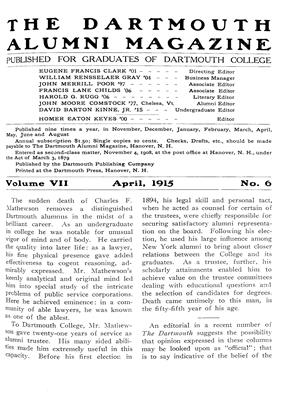BORN OCTOBER 4, 1841 DIED FEBRUARY 26, 1915
The death of one, whose connection with the College was as long as that of Professor Sherman, calls into distinct view the changes which he saw.
Of the Faculty, as he entered it in 1871, few are still alive. During his forty years of service he saw many come and go, more than still remain, and yet others come who were born while he was teaching and rose to sit beside him in chairs of instruction. Forty years of uninterrupted labor could not fail of a marked effect, and the impression made upon successive classes, as well as upon his associates in the Faculty and upon his neighbors of the village, was singularly definite and simple. He was not a man of moods, but, apparently unruffled by outward events, he went his placid way, in which his dignified walk, becoming somewhat slower under the infirmities of age, typified an evenness of spirit.
But in all his work and all his intercourse the quality that was most manifest, marking his whole character, was fidelity. What he thought was his duty, that he did. He was not assertive or quarrelsome, and as he did not try to force his way upon others, so he did not let others turn him from what he thought was right- It was his fidelity to duty that led him to volunteer in the service of his country in the Civil War, in which he received three wounds, one resulting in the loss of an arm, but his service was never a matter of boasting or his wounds of complaint. The same spirit was shown in his teaching. He taught long hours, especially in the Chandler School before it was merged in the College, but he did not complain because he felt that under the circumstances it was an obligation.
It was the same in any work of a public character. Whatever he undertook was done promptly and with exactness, whether it was the laying of the pipes of the village aqueduct, the construction of new sewers, the care of the cemetery, the conduct of the affairs of the precinct as commissioner, or the charge of the schools as member of the school board, when in particular he superintended the erection of the new school house in 1877. He was diligent in his business, public, professional and private, and the results were equally good, when seen in a building, a drawing or in the garden in which he delighted.
Professor Sherman was not a man who sought popularity, either in the community or among the students. His ideas were definite and definitely expressed without fear or favor. In teaching he strove to secure the same precision and exactness in others which he cultivated for himself, and nothing disturbed him more than carelessness and indifference. His years of faithful and honorable service have not failed of their rightful effect in the life of the College, and will long remain an effective force in the character of his pupils and in the welfare of the community.
 View Full Issue
View Full Issue
More From This Issue
-
 Article
ArticleANNUAL MEETING OF THE DARTMOUTH SECRETARIES' ASSOCIATION
April 1915 By Gray Knapp '12 -
 Class Notes
Class NotesLOCAL ASSOCIATIONS
April 1915 -
 Article
ArticleThe sudden death of Charles F.
April 1915 -
 Article
ArticleALUMNI PUBLICATIONS
April 1915 By ERVILLE B. WOODS -
 Article
ArticleTHE TRUSTEES' MEETING
April 1915 -
 Article
ArticleCANDIDATES FOR ALUMNI TRUSTEE
April 1915
Article
-
 Article
ArticleTHAYER SCHOOL CONFERS DEGREES ON CLASS OF SIX
May 1925 -
 Article
Article1935 Alumni Fund Drive Gets Under Way
May 1935 -
 Article
ArticleFriends of France
October 1939 -
 Article
ArticleWriter’s Canvas
July | August 2014 -
 Article
ArticleSWIMMING
FEBRUARY 1971 By JACK DEGANGE -
 Article
ArticleConfessions of a Former White House Intern
APRIL 1998 By Monica Oberkofler

